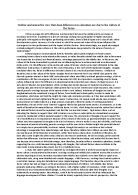Marxists pay more attention to subcultures than functionalists and their theories are associated with the CCCS. The CCCS is considered neo-Marxist and their view of youth subcultures is that they are a product of structural explanations such as the economy and social class rather than general explanations such as age.
Hall and Jefferson (1976) believed youth subcultures are a form of resistance to the ‘crisis of capitalism’. Through adopting a subcultural style youths were able to reject the dominant culture. Clarke (1976), who studied skinhead culture, believed that through the subculture they were able to exaggerate their working class background and hold on to tradition in the face of the extinction of working class communities. Brake (1980) suggested youth subcultures provide ‘magical’ solutions by providing safety from problems and an opportunity to express freedom and new ideas. The subculture allows them to convince themselves they will be able to solve the problems of their time but the solutions aren’t able to be sustained in reality, thus the reason they are referred to as magical.
Marxists are accused of ignoring the involvement of girls in subcultural groups and issues of ethnic identity. There is also an assumption in the CCCS work that most youths joined subcultures which is debateable as it is possible many were ‘ordinary youths’. The CCCS are also criticised of looking too far into the reasons why youths join subcultures, perhaps many of them joined just for fun. There have also been accusations of Marxists ignoring the role of the media in the formation of youth subcultures.
The main argument feminists make is that other approaches largely ignore the role of females in subcultures. McRobbie and Garber (1976) were critical of the work the CCCS for this reason. Their research on female subcultures identified a ‘Bedroom culture’ which features included experimenting with make-up and hairstyles, discussing boys and magazines. There are few studies of all-girl subcultures but one that has been in the USA are the ‘Riot Grrrls’ who use powerful image forms of communication to display their anger and feelings of oppression. The feminist view focuses mainly on gender related issues and has been criticised for this but this approach seems to suggest the role of youth culture for girls, in the case of bedroom culture, is to share information about their personal life and gain advice to help them through the transitional phase and in the case of the Riot Grrrls to express themselves and challenge the dominant culture which is perceived to be male oriented.
Postmodernists believe that youth style has become increasingly fragmented over the years. They argue that shared attachments are not the norm in the UK as youth styles are viewed as fluid changeable and eclectic. Bennett (1999) called these fluid and complex youth styles ‘Neo-tribes’. People can move in and out of these neo-tribes over time which reflects the transitory nature of youth. An example of a neo-tribe would be club culture. Polemus (1997) noted the ‘supermarket of style’ available to youths. They are able to choose from different fashions, music tastes and identities and mix them together to form their own.
Postmodernist views have been criticised as there are still examples of subcultures in the present day such as goths or emos. The idea of fluidity may also be overstated as most young people don’t move in and out of neo-tribes over long periods of time.
In conclusion, all of the approaches in a sense agree with youth culture being part of becoming an adult through increased independence and self-expression. It involves young people exploring their newfound responsibilities and freedoms along with ways to deal with any problems they face as a consequence.







![Outline and evaluate the view that religion is losing its significance in the contemporary UK. [33mk]](https://mbt-essays-prod-public.s3.eu-west-1.amazonaws.com/1211736/listing/1211736_1.jpg)
